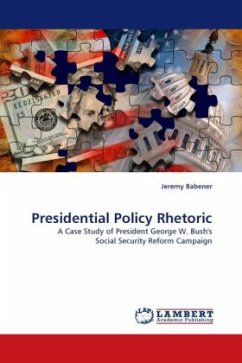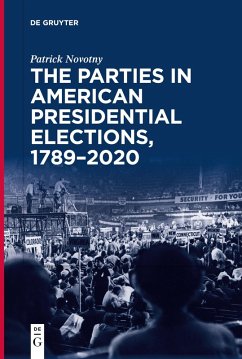
Presidential Policy Rhetoric
A Case Study of President George W. Bush's Social Security Reform Campaign
Versandkostenfrei!
Versandfertig in 6-10 Tagen
32,99 €
inkl. MwSt.

PAYBACK Punkte
16 °P sammeln!
This book undertakes a holistic analysis of President George W. Bush's 2005 Social Security Reform Campaign arguing for the option to set aside a portion of one's contributions into a personal account with several investment alternatives. The campaign represents a particularly useful example of a concerted effort by a president to persuade the nation, partly because he led on the issue so publicly. In this attempt, the President did not succeed. Making use of classical and modern understandings of rhetoric, psychology, and political science, the book looks at the President's language, likely s...
This book undertakes a holistic analysis of President George W. Bush's 2005 Social Security Reform Campaign arguing for the option to set aside a portion of one's contributions into a personal account with several investment alternatives. The campaign represents a particularly useful example of a concerted effort by a president to persuade the nation, partly because he led on the issue so publicly. In this attempt, the President did not succeed. Making use of classical and modern understandings of rhetoric, psychology, and political science, the book looks at the President's language, likely strategies, and evaluates his arguments. Few of the findings are likely unique to President Bush, speaking more generally to the practice of modern American political persuasion. Building on past work, the book develops several strategies of rhetorical campaign analysis, many of which unveil a political strategy that today's media and public should recognize more quickly: the preference and use of emotive over logical appeals.












